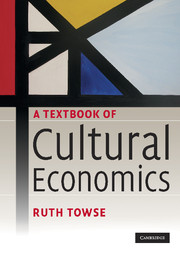Book contents
- Frontmatter
- Contents
- List of figures
- List of tables
- List of boxes
- List of abbreviations
- Preface
- Part I General issues in cultural economics
- Introduction
- 1 Introduction to cultural economics
- 2 Economic profile of the cultural sector
- 3 Markets for cultural goods and services
- 4 Economic organisation of the creative industries
- 5 Production, costs and supply of cultural goods
- 6 Consumption of cultural goods and services
- 7 Welfare economics and public finance
- Part II The ‘traditional’ economics of the arts and heritage
- Part III Artists' labour markets and copyright
- Part IV The creative industries
- Part V Conclusion and exercises and problems
- References
- Index
6 - Consumption of cultural goods and services
- Frontmatter
- Contents
- List of figures
- List of tables
- List of boxes
- List of abbreviations
- Preface
- Part I General issues in cultural economics
- Introduction
- 1 Introduction to cultural economics
- 2 Economic profile of the cultural sector
- 3 Markets for cultural goods and services
- 4 Economic organisation of the creative industries
- 5 Production, costs and supply of cultural goods
- 6 Consumption of cultural goods and services
- 7 Welfare economics and public finance
- Part II The ‘traditional’ economics of the arts and heritage
- Part III Artists' labour markets and copyright
- Part IV The creative industries
- Part V Conclusion and exercises and problems
- References
- Index
Summary
This chapter deals with the demand side of the market – the consumption of cultural goods and services. In economic terms, the buyers, audiences, visitors and viewers of the whole range of cultural products of the creative industries can be thought of as ‘consumers’ when they buy an item such as a ticket to go to a concert or to visit a monument or when they buy a book. Two aspects of the consumption of cultural products are analysed: patterns of consumption as revealed by consumers' purchases of cultural goods and services, and the theory of demand, which seeks to explain the choices consumers make. Consumer spending is the source of revenue for producers; for for-profit suppliers it is their sole source, and for subsidised non-profit organisations it represents some proportion of their income. Understanding consumer behaviour is also achieved by analysing participation in cultural activities by looking at the socio-economic profiles of consumers.
Participation and demand
Participation in the arts and heritage may take place with or without payment for admission, and the characteristics of participants, such as age and family background, are important information for policy-makers. The theory of demand seeks to explain consumer behaviour in terms of the economic factors that affect consumer decision-making, in particular price and income. Studies of participation are complementary to the theory of demand because they provide a picture of consumers that economic variables alone cannot.
- Type
- Chapter
- Information
- A Textbook of Cultural Economics , pp. 135 - 160Publisher: Cambridge University PressPrint publication year: 2010



